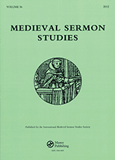
Medieval Sermon Studies
Scope & Guideline
Unraveling the Tapestry of Medieval Discourse
Introduction
Aims and Scopes
- Historical Analysis of Sermons:
The journal emphasizes the historical context of medieval sermons, examining how sermons reflected and shaped the beliefs and practices of the time. - Thematic Exploration of Preaching:
It investigates key themes in medieval sermons, such as conversion, morality, and the role of saints, contributing to an understanding of medieval spirituality. - Interdisciplinary Approaches:
The journal employs interdisciplinary methodologies, incorporating insights from history, literature, theology, and art to enrich the study of medieval sermons. - Cultural Interactions:
There is a focus on the interactions between different cultures and religions, particularly in relation to preaching and its impact on community identities. - Exempla and Rhetoric:
The use of exempla (moral anecdotes) and rhetorical strategies in sermons is a key area of study, highlighting the persuasive techniques employed by medieval preachers.
Trending and Emerging
- Preaching and Conversion:
The theme of conversion, particularly in the context of late medieval preaching, has gained prominence, highlighting its psychological and social dimensions in the medieval experience. - Interfaith Encounters and Dialogues:
Recent studies increasingly explore the interactions between Christian, Jewish, and Muslim preaching, reflecting contemporary scholarly interest in interfaith dialogue and cultural exchanges. - Visual Culture and Preaching:
The incorporation of visual imagery in preaching, especially Marian imagery, indicates a growing recognition of the role of visual culture in religious instruction and its psychological impact. - Rhetoric and Persuasion Techniques:
Analyzing the rhetorical strategies employed in sermons has become a focal point, revealing how preachers crafted their messages to resonate with their audiences effectively. - Numeracy and Spiritual Calculations:
The exploration of numeracy and its significance in late medieval sermons represents a unique intersection of theology and mathematics, showcasing the intellectual currents of the time.
Declining or Waning
- Focus on Traditional Saints' Sermons:
There has been a noticeable decrease in studies centered on traditional sermons about well-known saints, suggesting a shift towards more diverse and lesser-known figures. - Medieval Legal and Canonical Preaching:
Research on the intersection of preaching and legal frameworks, such as canon law, is less prominent, indicating a potential waning interest in this aspect of sermon studies. - Exclusively Latin Sermons:
The focus on Latin sermons alone has diminished, as there is a growing interest in vernacular sermons and their role in medieval society. - Sermons in Isolated Geographical Contexts:
Studies concentrating solely on isolated geographical contexts are less frequent, as scholars increasingly adopt comparative approaches that encompass broader regions and cultures.
Similar Journals

Espacio Tiempo y Forma-Serie III-Historia Medieval
Unveiling the Rich Tapestry of Medieval NarrativesEspacio Tiempo y Forma-Serie III-Historia Medieval, published by the Universidad Nacional de Educación a Distancia (UNED), is a prominent open-access journal dedicated to advancing research in medieval history. Since its establishment, this journal has gained a significant reputation within the academic community, achieving Q1 rankings in both Classics and History, reflecting its commitment to high-quality scholarship and insightful contributions to the field. With a remarkable Scopus ranking of 36th in Classics and 589th in History, it places itself among the top-tier publications, ensuring visibility and impact for its authors. Open access since 2011, the journal promotes the dissemination of knowledge to a broader audience, enhancing academic engagement and fostering collaboration among researchers globally. With its rich resources, the journal attracts a diverse readership, including historians, students, and professionals keen on exploring innovative perspectives in medieval studies.
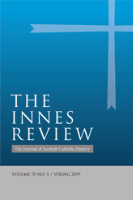
Innes Review
Illuminating the past, present, and future of cultural studies.The Innes Review is a distinguished academic journal published by Edinburgh University Press, focusing on the study of culture, history, and religion. With a commitment to advancing scholarly discourse, the journal serves as an essential resource for researchers and professionals alike, providing critical insights and analyses that cater to the diverse interests within Cultural Studies, History, and Religious Studies. Established in 1996 and continuing through 2024, the journal has achieved notable recognition, reflecting its contributions through its Q3 ranking in History and Q4 rankings in Cultural and Religious Studies according to the latest metrics. While it currently operates without an open access model, the Innes Review remains accessible through a variety of academic databases and resources, underpinned by rigorous peer-review processes that ensure high-quality publications. As such, it stands as a vital platform for disseminating innovative research and fostering intellectual engagement within the humanities.

De Medio Aevo
Bridging Disciplines to Enrich Understanding of the Medieval WorldDe Medio Aevo is a distinguished academic journal published by UNIV COMPLUTENSE MADRID, SERVICIO PUBLICACIONES, dedicated to enriching the fields of Cultural Studies, History, Literature and Literary Theory, Philosophy, Religious Studies, and Visual Arts and Performing Arts. Since its inception in 2012 as an Open Access platform, this Spanish journal has rapidly established its reputation, achieving impressive rankings in various categories with a Q1 classification in Literature and Literary Theory and notable positions in Q2 across other fields as per the 2023 metrics. With an emphasis on rigorous scholarly research, De Medio Aevo seeks to foster the exchange of ideas and insights that reflect the rich tapestry of medieval studies and its ongoing impact on contemporary society. It is an essential resource for researchers, professionals, and students alike, encouraging interdisciplinary dialogue and exploration of the cultural narratives that shape our understanding of history and the arts. Located in Madrid, Spain, the journal is committed to making significant contributions to its fields, with a global reach and a focus on academic excellence.
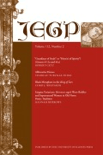
JOURNAL OF ENGLISH AND GERMANIC PHILOLOGY
Cultivating Knowledge in English and Germanic PhilologyJournal of English and Germanic Philology, published by University of Illinois Press, stands as a prestigious forum for scholarly discourse in the fields of linguistics and literary studies. With its ISSN 0363-6941 and an impressive impact factor aligning it within the Q1 and Q2 quartiles in key academic categories, this journal delves into nuanced explorations of both the English and Germanic languages, enriching the understanding of language and its literary frameworks. The journal aims to foster interdisciplinary dialogue, offering cutting-edge research that appeals not only to linguists and literary theorists but also to educators and cultural historians alike. Although the journal is not open access, its contributions are essential for anyone keen on enhancing their knowledge of linguistic phenomena and literary narratives from these influential linguistic traditions. With a commitment to publishing innovative and rigorous scholarship, the Journal of English and Germanic Philology is a vital resource for academics seeking to advance their work in language and literature.
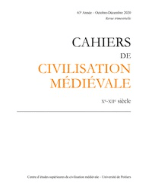
CAHIERS DE CIVILISATION MEDIEVALE
Connecting Scholars Through Medieval DiscourseCAHIERS DE CIVILISATION MEDIEVALE is a distinguished scholarly journal focusing on the multifaceted aspects of medieval civilization, including its history, literature, visual arts, and performing arts. Published by the CENTRE ETUD SUPERIEUR CIV MED in France, this journal serves as a vital resource for researchers, professionals, and students striving to deepen their understanding of the medieval period. Although the journal’s impact factor and HIndex are not explicitly listed, it has been categorized in Q4 for 2023 in key areas such as History and Literature, indicating its role within niche academic discussions. With content spanning converged publication years from 2002 to 2014 and 2017 to 2023, CAHIERS DE CIVILISATION MEDIEVALE aims to foster a rich dialogue among scholars in the field, while its accessibility options provide a pathway for the dissemination of knowledge. Dive into the intricate world of medieval studies through this essential publication, which seeks to elevate the discourse and provide a platform for innovative research.

Imago Temporis-Medium Aevum
Unlocking the Secrets of the Middle AgesImago Temporis-Medium Aevum is a distinguished journal published by SPACE POWER & CULTURE- CONSOLIDATED MEDIEVAL STUDIES RESEARCH GROUP, focusing on the rich tapestry of medieval studies within the context of history. Based in the culturally vibrant region of Catalonia, Spain, this journal has established itself as a vital resource for scholars and enthusiasts alike since it adopted an Open Access model in 2007, ensuring that its compelling research is widely accessible. With an impact factor reflected in its Q3 category ranking in the field of History for 2023, and an impressive Scopus rank in the 62nd percentile amongst 1,760 publications, Imago Temporis continues to serve as an incubator for innovative scholarship. The journal's consistent publication history, particularly from 2011 to 2013, 2016 to 2018, and its ongoing commitment through 2024, underscores its dedication to advancing the understanding of the medieval era. Researchers, students, and professionals are encouraged to engage with its unique content, which is poised to challenge traditional perspectives and contribute to the global discourse in medieval studies.

Espana Medieval
Cultivating Knowledge of Spain's Enigmatic Medieval EraEspana Medieval is an esteemed academic journal dedicated to the exploration of medieval studies within the broader historical context of Spain. Published by the UNIV COMPLUTENSE MADRID, SERVICIO PUBLICACIONES, this peer-reviewed journal has established its reputation since becoming Open Access in 2004, thereby ensuring that vital historical research is accessible to a global audience. With an impressive Q1 ranking in History and a notable Scopus rank of 773 out of 1760, this journal plays a pivotal role in shaping contemporary scholarship in the field. Researchers and professionals can expect high-quality, rigorously vetted articles that delve into various aspects of medieval history, culture, and society, contributing to a richer understanding of the medieval past. Located in the vibrant academic milieu of Madrid, Spain, Espana Medieval continues to be a leading voice for historians, promoting innovative research and fostering academic discourse. Submissions from scholars worldwide are welcomed, encouraging a diverse array of perspectives on the medieval period.

Carte Romanze
Unveiling the Rich Tapestry of Literary ExpressionCarte Romanze is a prominent academic journal published by Milano University Press, dedicated to the field of literature and cultural studies. With an ISSN of 2282-7447, it offers an invaluable platform for researchers, professionals, and students interested in exploring the rich landscapes of narrative and cultural expression. Since its transition to Open Access in 2013, the journal has championed the dissemination of knowledge, making high-quality research freely available to a global audience. Situated in the historic city of Milan, the journal aims to foster interdisciplinary dialogue and innovation in literary scholarship while maintaining rigorous academic standards. As it continues to contribute to the landscape of contemporary literature studies, Carte Romanze is poised to inspire new scholarly conversations and ideas.

STUDI MEDIEVALI
Fostering Interdisciplinary Dialogue on Medieval LifeSTUDI MEDIEVALI, published by the Centro Ital Stud Sull Alto Med, is a premier journal dedicated to the exploration of medieval studies, focusing on both cultural and historical dimensions. Since its inception in 2002, this journal has become an essential resource for scholars and students alike, providing critical insights into the complexities of the medieval era. Although it currently operates under a traditional access model, its contributions to the field are undeniable, with a 2023 ranking in the fourth quartile for Cultural Studies and History categories in Scopus rankings, highlighting its niche yet valuable position within academic discourse. Based in Spoleto, Italy, the journal serves as a platform for innovative research and interdisciplinary dialogue, inviting contributions that challenge conventional understandings and stimulate further inquiry into medieval life. Researchers and professionals will find in STUDI MEDIEVALI an opportunity to engage with a community of passionate scholars dedicated to uncovering the multifaceted realities of the medieval period.
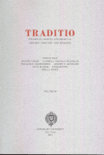
TRADITIO-STUDIES IN ANCIENT AND MEDIEVAL HISTORY THOUGHT AND RELIGION
Advancing Knowledge in Ancient and Medieval ScholarshipTRADITIO - Studies in Ancient and Medieval History, Thought and Religion is a distinguished academic journal published by Cambridge University Press, dedicated to the exploration and analysis of historical, philosophical, and religious narratives from ancient and medieval periods. The journal's ISSN is 0362-1529 and its E-ISSN is 2166-5508. Renowned for its rigorous scholarship, it enjoys a notable standing in the academic community, reflected in its 2023 category quartiles which place it in the second and third tiers across critical fields such as Literature and Literary Theory, Philosophy, Religious Studies, and Visual Arts and Performing Arts. With its comprehensive scope that encompasses multidisciplinary approaches, TRADITIO provides an essential platform for researchers, academics, and students alike to engage deeply with the complexities of historical thought and cultural practices. Although the journal operates within the traditional subscription model, its significance is underscored by impressive Scopus rankings, indicating its high visibility and impact within the arts and humanities sectors. We invite you to discover the richness of ancient and medieval studies through the pages of TRADITIO.